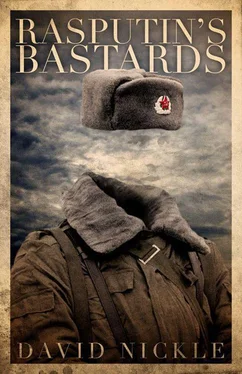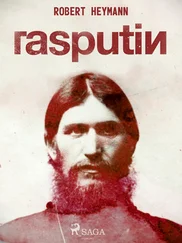“That’s gotta suck.”
“And that’s not the worst of it.”
Leo nodded — encouraging her to talk.
“There’s something with Vladimir,” she said. “Kolyokov tried to talk to him. And that’s when things went to hell. The kid doesn’t trust him.”
“Why’s it important that the kid trust him?”
“Well,” said Heather, “this is going to sound weird.”
“We’re way past weird.”
“I get the sense that Kolyokov just wants to make amends.”
“You get that sense?”
“Stop making fun of me.”
“No. I’m serious. You get that sense? All I know is I step in there and my brain’s torn six ways to Sunday,” said Leo.
Heather laughed. “What the fuck does that mean — ‘six ways to Sunday’?”
“Fuck if I know.”
And they’d sat there, watching Borovich and waiting for Kolyokov to come back to them. It was cold — so what the fuck — Heather sidled up next to Leo, who put his arm around her. She rested her head on his shoulder and they stared out the aerie.
Borovich looked up at them. “Contact,” he said. “That is important, is it not?”
Leo felt himself bristling. “Nothin’ goin’ on here.”
“You like our lighthouse?” he asked.
“It’s nice,” said Leo. “Don’ know what the fuck it’s doin’ here. No ships come by here do they?”
“It was here when we came,” said Borovich. “When Babushka came here. She’d had it built in the early days. Canadian government money.”
“Why?”
“Because,” he said, “she could.”
“Like the Emissary Hotel,” said Leo, nodding. “A hotel nobody knows about — a lighthouse nobody can see. What is that — some fuckin’ Zen Buddhism thing? Like if a tree falls in a forest and nobody hears it is there, like, a sound? Or are you just fuckin’ stupid?”
Vasili laughed. “You’ve been thinking of things — haven’t you?”
Heather stirred against him. “Don’t listen to him,” she whispered in his ear, in the familiarly dense Russian accent of the old Hotelier. “Fuck,” said Leo, and pushed her away, as Kolyokov continued through her: “He is an old fool.”
“At least I am not dead like Fyodor Kolyokov apparently is. I am an old fool who still breathes with his own lungs.”
“No,” said Kolyokov, “those are not your lungs. You gave them up to that witch Lena, hey? Idiot. Now look where you are.”
“The foolishness of youth.” Vasili wriggled in his bonds. They’d tied him to a wooden chair with a couple of lengths of rope they’d found lying next to it. “You should let me up, Fyodor.”
“Not yet.” Heather got up. It was amazing how she moved differently depending on who was in the driver’s seat. When it was her, she was lithe and fast like she knew what she had. With Kolyokov, she walked — shuffled really — like an old man. She shuffled over to Vasili Borovich. “Tell me now. You tried to kill Alexei Kilodovich, is that not so?”
Borovich blanched. “How can you know this?”
Kolyokov chuckled. “I have been watching. In this very room — you sent our friend John Kaye to murder Alexei, didn’t you?”
“No.”
“Not directly. But you had him send that puppet James. Is that not so?”
“Alexei Kilodovich,” said Vasili, “is the most dangerous thing we made. Babushka has been searching for it — from mind to mind. She asks: Where is Kilodovich . Can you blame me for wishing his death?”
“You play both sides,” said Kolyokov. “A double agent. Is that what I am to believe?”
“Believe what you want.”
“Okay. I believe you are a snake who will do whatever suits you. I leave you tied.”
“Wait!” He looked to Leo then. “You! Untie me! Tell him!”
Leo sat up. “You tried to kill Alexei?” He went over to Vasili. He leaned over him. Alexei was, after all, Leo Montassini’s soulmate. Or something. “You motherfuck,” he said and clocked him. Vasili Borovich went out like a light.
Leo went back and sat beside Heather. He looked at her and she looked at him. Finally, he said: “Is, uh, Heather in there?”
Heather’s eyes blinked. “She is watching television,” said Kolyokov through her.
“Right.” Leo crossed his arms and looked out the window. “Television.”
“She is a dear child,” said Kolyokov.
“She’s a grown woman.”
“Inside,” said Kolyokov, “she’s a child.”
“You tryin’ to warn me off?”
“It would do no good.”
“Fuckin’ right.”
Kolyokov snorted through Heather’s nostrils. He sidled up close to Leo, who shuddered but didn’t move away.
“Did I ever tell you,” said Kolyokov, “of the time we went to war against the Americans?”
The Imperial Navy of New Pokrovskoye stretched in a line south from the Empire’s main port. The Navy was expecting attack. It had been warned of this through its network of spies — that there would be a lethal strike against New Pokrovskoye and that it would come from the water.
From an old enemy who dwelt in a fabulous city at the bottom of the ocean.
It could come at any time. That was the word from the Admiralty. So the Navy prepared itself.
Fishing boats that had dragged nets behind them to feed the Imperial leadership these many years were mounted with harpoons and guns. Crew were given rifles and submachine guns from a cache in the back of the museum. They lined the edges, peering down — on a silent vigil, watching for the attack from beneath.
Miles Shute, who had once captained the guard of a great, black tower — a hotel in Manhattan — and was now a midshipman on the Aleksandr Shabalin — a forty-three-foot tuna boat — ran his hand over the stubble of hair on his scalp. The rest of the crew here were doing exactly as they were told — just watching down, watching for the thing from below. That was, he understood, how they were raised — how they were made to work.
Miles took a different view toward his servitude.
He had experience watching for attack — it was trained in him as surely as was his life in New Pokrovskoye, his fealty to the Babushka, when he guarded the
Tower in the South in a different life — a different land.
He had hated his old master there — Fyodor Kolyokov, the devil in brine. But he had taught him some things, particularly when it came to standing guard. Anybody could watch for attacks from the front. Miles should be aware of the side, the rear, above. All directions. Leave the obvious weaknesses for others. You — look in unexpected places.
So Miles did. He looked up, at the grey morning sky, with a threat of rain. He looked to the north, where they were coming from — sighting on the diminishing nub of the lighthouse that guided ships to port in New Pokrovskoye. From there? No.
He walked across the pitching deck of the Aleksandr Shabalin , pushing past two of the older hands. One of them — Makar — bore a bandage across his scalp, from a fight last night that he would not speak of in any detail. He stood with Orlovsky, the old man whose daughter had died last night. Both stared to the east, sparing him the barest gaze for not doing likewise.
Miles turned his attention to the west — to the rocky, barren shoreline of this land. They were maybe a half-mile out from a tiny isthmus that pushed into the sea, and it looked deserted, like the virgin country it must have been before the settlers who founded New Pokrovskoye came here, and turned a village into an empire.
It was barren. But as he listened, he could hear echoing from the rocks and the water the hum of a motor. It did not sound like the sort of motor Imperial New Pokrovskoye employed in its navy.
Miles tapped another man he didn’t know well on the shoulder and pointed. That one shrugged him off, so Miles moved along — first one, then another, each ignoring Miles as the motor grew louder. Finally he stopped and looked again — for the craft had rounded the rock and he could see it for what it was: a fast-moving little cabin cruiser. At least, someone had built it to look like a cabin cruiser. It was maybe thirty-five feet — but judging from the speed it moved at, it came with a powerful engine. And that wasn’t the only modification. On its fore deck, where normally one might find a dinghy, there was something else.
Читать дальше












